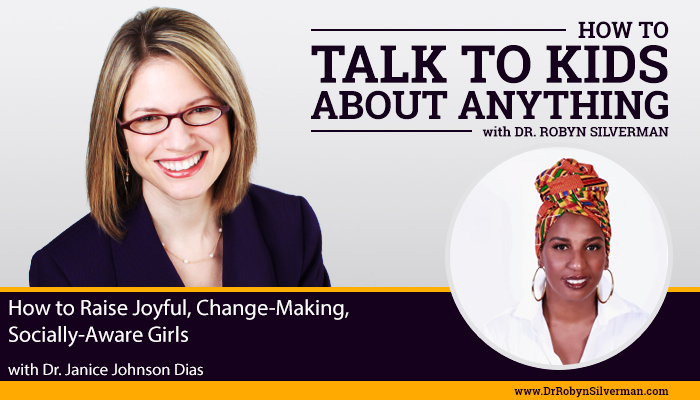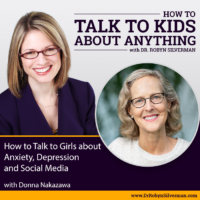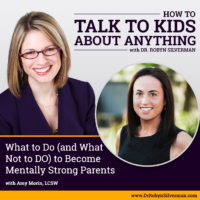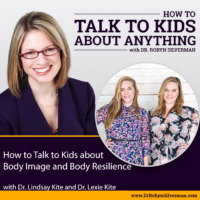Podcast: Play in new window | Download
Subscribe: Apple Podcasts | RSS | More
How to Raise Joyful, Change-Making, Socially-Aware Girls
This podcast focuses on how we can find joy even during this “super-sucky time” and how we can help our girls become socially-aware, passionate volunteers who can make important changes in our society. Dr. Robyn Silverman interviews Dr. Janice Johnson Dias, author of Parent Like it Matters: How to Raise Joyful, Change-Making Girls on this week’s episode of How to Talk to Kids about Anything.
INTRODUCTION:
Can we teach our daughters to change the world for the better? Through conscious parenting choices, we can give our girls the resources to not only take hold of their own futures but also assist other girls, pulling them upwards and forwards so that change becomes a chain reaction and a powerful one at that. It may seem counter-intuitive, in a world that often tells parents to put their children first by dwarfing their own passions—taking a back seat in their own lives so that their children can move ahead- our next guest posits that by finding our own joy, we can inspire our girls to discover and live by theirs. By laying down the burdens of our past, turning our challenges into adventures, and our failures into lessons we can teach our girls many important lessons. But just as important, we can help our girls to identify her heroes and mentors, her own strengths and allow her to teach us a thing or two each week about who she is and how she sees the world.
Bio:
Dr. Janice Johnson Dias holds a Ph.D. in Sociology from Temple University with a specialization in urban and political sociology. Her funded research focuses on mothers and children has appeared in the top-ranking policy and social science journals. She is a tenured associate professor of sociology at John Jay College of Criminal Justice, and president of the GrassROOTS Community Foundation, a New Jersey-based training institution with a focus on public health and social action that she co-founded in 2011. Dr. Johnson Dias currently lives in West Orange, New Jersey, with her husband, Scott Dias, their daughter Marley and dog Philly. She has just published her first book with Ballantine Books/Random House, Parent Like It Matters: How to Raise Joyful-Changemaking Girls. It summarizes her life experiences and offers practical tips of how caregivers can raise children who are devoted to social justice.
Important Messages:
- Let’s not focus on the performance (the smile, how you look or don’t look happy) but the quiet sustained feeling of joy.
- You can be completely mad today- but inside is a foundational contentment that lasts and sustains. Joy sustains, happiness is temporary.
- Don’t give up hope- and don’t surrender now.
- If we try to do something in this moment that enhances us and contributes to making this moment better- the action part- you won’t feel like surrendering. It can almost replicate this feeling of hope.
- It’s not just about doing stuff for others- it’s also about what you are getting from doing stuff for others.
- Just like when you are tired and the doctor says to exercise- you don’t want to do it- but it actually works!
- Take a half of a step in a positive direction! Instead of standing in one place.
- You should matter more to you than your kids.
- The best road map for your kids is you.
- Are you joyful, Mom and Dad? Are you doing the things that fill your bucket? Why are you demanding more of me than you are yourself?
- Questions: What brings ME joy? What am I passionate about? Do that!
- No matter what you say, they will model what you do rather than what you say. Model, coach. Be truthful to what you want from them. You are their best guide.
- The solution that I give you is not going to erase reality.
- Don’t starve yourself as if some big meal is coming! Do a little something.
- You like the stage? This is not a stage moment. But what can you extract from that?
- This is about connecting. How else can. You get that? Don’t just starve. Take some step.
- You can side step to move forward- it might not be a straight line forward but you are still getting there.
- You have to enrich you- and engage others.
- Pivot- stumble. Moves you out of inertia.
- You have the power to create joy and enhance good. Take mini steps. It doesn’t have to be a huge leap.
- We can’t always feed the outside. We must feed the inside.
- Help students to be exposed to all sorts of other people. Don’t erase others. Don’t erase the issue or the problem.
- For example- white kids mesmerized by black hair. Want to touch it. Instead of burying it under the rug- who is in our neighborhood, what’s America- need to be able to be friends with others.
- Kids confused. Kids are being asked to explain race and history of touching black hair. Learn- google it- history of touching black hair. Educate yourself.
- Before scolding a child for sending a negative note- why did you write that note? What was that about? Would you want that note written about you? Delivered to you? How would that feel?
- Kids are not being walked through issues. Candy- give it to them, they are just kids after all. Issues of social justice- well, they are just kids after all. “They’ll just outgrow it.” Nobody walked them through the actions they did. And the consequences. We have to invite the kids to be learners and to apologize. And offer strategies for how to make the situation better.
- We don’t have to have the answers- we have to have the questions and then search out the answers to the questions together.
- Social justice and lessons about racism have to be weaved into the fabric of the everyday- not a separate tangent. A girl pushes the chair over of the boy…talk about it.
- Don’t wait until the kids are in 5th or 6th grade to talk about these important concepts.
- Integrate- not adding another thing.
- Joy, change-making plus social justice.
- Sexualization and gender. Weave it in.
- How do teachers talk about their students? “You are giving it all away with that outfit!”
- By the time our girls are outside of our house, they need to be made aware of their experience of gender in the house- and outside of the house. Gendering. Why did the teacher think that the I needed to pull down my shirt when I did that cartwheel but she didn’t say it to the boys? They might not be aware. Need to be aware that the gender construction in our society is wrong. There is a notion that those who present as men are more powerful, capable, and better than those who work and present as girls. And it’s wrong. Need to be upfront.
- Girls need to be aware of this so that they don’t blame themselves when they are being gendered.
- Clothes/haircut: You have to realize why you feel the way you do about the haircut/clothes- while you may have strong views about what you do or don’t want your child to wear or what you want them to look like, you have to realize “it’s not you” to your daughter. “My daughter should be able to walk down the street naked and nobody touch her.” The context that she lives in make it relevant- but they should not, in and of themselves, relevant.
- Vulnerable populations “When we have to demean ourselves to the police, we know this is grossly bad but we do it for our survival. But we must always bare in mind that it’s the structure that is the problem, not us.”
- So think of the short haircut. You want to cut your hair- but the structure says that they are going to call you bad names, they are going to call you a lesbian in a mean and demeaning way. Or with clothes- call you a slut. Why do you want your hair shorter? Why do you want to wear those clothes? If they answer- then you have to suck that up. You have to help make the world safer for your child- it can’t always be that your child accommodates.
- Dress codes exist to monitor girls bodies.
- What is the PTA doing to make sure people are not being derogatory and mean?
- If you think the rules are sexist- then you need to work with your friends to get them changed—not show up to school in this outfit. It’s then when you can wear anything you want.
- If you want your child to volunteer- then you need to volunteer.
- If you are just marching into your child’s room and taking their old stuff and giving it away- that’s not helping with volunteerism.
- When you think about the world, and all the things that are wrong, and when you think about what you enjoy and where you can put your joy, what can you do to lend your gifts to the world? Do that. Model- what giving looks like. Invite them to participate in yours- and then help them to uncover their passion for what kind of volunteering they love.
- QUESTIONS: Volunteerism. There are different things happening all year- talk to kids about what’s going on each month. How do we feel about doing a walk for breast cancer, for example? Minority health month. What do you find frustrating in your universe? School, community? What would you change?
- Before asking your kids about it- you think about it.
- Adopt the idea- most of the problems in our world are human made- we can remake them!
We own ourselves- if there are things we don’t enjoy about ourselves- we can change them. We can make the world a better place. We can start with our kids.
Notable Quotables:
- “We are in a super sucky moment right now—it’s hard to smile- but what we can hold close is the optimism. We can hold close that if we invest in ourselves and invest in others, that that will sustain us beyond the super-sucky moment. That’s what I call joy.”
- “You can be mad today- you can be completely irritated tomorrow- but inside of you is a foundational contentment that lasts and sustains. Joy is sustaining, happiness is temporary.
- “If we try to do something in this moment that enhances us and contributes to making this moment better- the action part- you won’t feel like surrendering. It can almost replicate this feeling of hope.”
- “Many people feel like there is nothing that they can do- there’s all this racism, there’s all this homophobia, that feeling is too heavy. I’m suggesting that we take a very small piece and chip away at it. The very act of chipping away at it is going to invite optimism in. It’s when you do nothing that you can overwhelmed by that feeling of hopelessness.”
- “For your kids to see what’s possible—the best road map is you.”
- “You have to be truthful to what you want from your kids. You are their best guide.”
- “We can’t do it all right now- so what can you extract that still feeds you? You don’t want to starve yourself in hopes that some great meal is coming! You’re going to wither away! So what are you going to feed yourself in this moment? Take what is doable, practical and enriching and do that.”
- “If you stumble, you actually move forward.”
- Strategies of social justice are things we have to have in our toolbox.”
- “Issues of race, gender, class, sexuality, are not tangential to why some kids succeed in school and why others are failing.
- “Vulnerable populations know this: When we have to demean ourselves to the police, we know this is grossly bad but we do it for our survival. But we must always bear in mind that it’s the structure that is the problem, not us.”
- “Talk to your girl and tell her; these are the rules as they are. It’s important that you follow the rules while working to break the rules.”
- “If you want your child to volunteer- then you need to volunteer.”
Resources:
GrassrootsCommunityFoundation.org
IG: @DrJaniceJohnson
Book: Parent Like it Matters: How to Raise Joyful, Change-Making Girls








